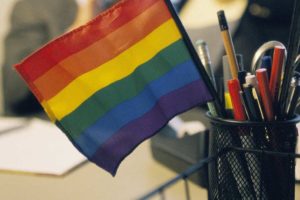Showing Some Pride: Updates On LGBTQ Equality In Workplaces
In spite of the U.S. Supreme Court recent ruling backing an Indiana baker who would not create a wedding cake for a same-sex couple, the latest research and news on inclusivity in the workplace is more encouraging.
The new 2018 Corporate Equality Index from the Human Rights Campaign Foundation, the educational arm of the nation’s largest LGBTQ civil rights organization, shows the global number of employees with a corporate non-discrimination policy protecting against sexual orientation or gender identity discrimination is 14.5 million.
“Human Rights Campaign data shows more companies worldwide are demonstrating fair workplaces for LGBTQ employees. #PrideMonth”
“A total of 106 top businesses are corporate supporters on the Equality Act — landmark federal legislation that would provide the same basic nondiscrimination protections to LGBTQ people as other protected groups under federal law,” according to the HRC.
The report states, “Of the employers in the CEI with global operations, 98 percent extend sexual orientation and gender identity-based workplace protections throughout their international systems.”
Read more in Take The Lead on LGBTQ leaders making a difference
In 2018, 609 companies earned a perfect 100 points on the index, up from 517 in the 2017 report. Gender identity is now part of non-discrimination policies at 83 percent of Fortune 500 companies, up from just 3 percent in 2002. Additionally, 459 major employers have adopted supportive inclusion guidelines for transgender workers who are transitioning.
“Gender identity is now part of non-discrimination policies at 83 percent of Fortune 500 companies, up from just 3 percent in 2002. #Progress”
Research shows inclusivity pays off.
A separate study of 1,000 companies across 12 countries by McKinsey & Co. showed that those in the top quartile for gender diversity were 21 percent more likely to have above-average profitability than companies with lower gender diversity rates, “according to Quartz.
Self-identification is also becoming a growing option in many corporations and workplaces in this country.
According to the HRC Corporate Equality Index 2018 survey of 947 employers, 49 percent allow employees to voluntarily disclose their sexual orientation and gender identity on anonymous surveys or confidential human resource records. This compares to 27 percent in the 2008 survey and just 17 percent in the 2006 survey, according to PR Newswire.
“We are delighted to be the first major human capital management vendor in North America to provide LGBTQ Self-ID in a proactive way that gives HR teams more insight into areas such as engagement, compensation and performance,” said Linda Mougalian, division vice president of product marketing and strategy at ADP, according to PR Newswire.
Apps and digital features such as ADP Vantage HCM® or ADP Workforce Now® “enable the Self-ID feature to invite employees based in the United States to anonymously and confidentially disclose gender identity or sexual orientation alongside dimensions such as race, gender, veteran status and disability. Organizations have the ability to turn this feature on or off and access to the anonymized employee data is only given to those users that have been authorized,” according to PR Newswire.
These new workplace practices and policies reflect a larger cultural shift to inclusivity for LGBTQ individuals, in spite of recent rulings and policy attempts to limit workplace rights.
“New workplace practices and policies reflect a larger cultural shift to inclusivity for #LGBTQ individuals, in spite of recent rulings and policy attempts to limit workplace rights. #Pride”
According to Fast Company, “A large majority (72 percent) of Americans support nondiscrimination protections for LGBTQ people, and nearly all of the Fortune 500 and 68 percent of small businesses do, too, because they know that diverse staff yield innovative results.”
Ineke Mushovic writes in Fast Company, “And wherever states have attempted to allow employers to discriminate, the economic costs have been swift and steep–meaning companies have moral as well as business reasons to lobby for nondiscrimination laws.”
During Pride Month and of course throughout the year, efforts at inclusivity are critical to create a safe and welcoming environment for all employees.
“During #PrideMonth and of course throughout the year, efforts at inclusivity are critical to create a safe and welcoming environment for all employees. ”
“Being an LGBT-inclusive employer is a process that can start with everyday actions. This can range from activity like pledging support during Pride or Trans Day of Remembrance, hosting LGBT networking events, profiling LGBT role models in the workplace or offering diversity training to staff. Each of these kinds of initiatives can help create a work environment where LGBT staff can be themselves and, because of that, thrive at work,” according to the Huffington Post.
“We have a recruiting program to attract the LGBTQ community. I just love it. The people we’re able to attract from that is just great,” Dominic Barton, global managing director of McKinsey & Company, and recipient of The Trevor Project’s distinguished 20/20 Visionary Award, recently told Forbes.
Read more in Take The Lead on orientation fairness in the workplace
Barton continues, “Our GLAM network (McKinsey & Company’s LGBTQ business resource group) is the fastest growing network in the firm. Not only from a moral point of view is this important, but from a business and economic point of view it’s important.”
While workplace cultures are improving, employees who identify as LGBTQ still encounter obstacles in this country and beyond.
“While workplace cultures are improving, employees who identify as #LGBTQ still encounter obstacles in this country and beyond.”
Lawrence Spicer, vice-president of audit, personal and commercial banking at the Royal Bank of Canada, recently told The Globe and Mail, “On a day-to-day lived experience, [gay] people still experience a lot of obstacles, such as stigma, bias and opportunities for promotion.”
About the Author
Michele Weldon is editorial director of Take The Lead, an award-winning author, journalist, emerita faculty in journalism at Northwestern University and a senior leader with The OpEd Project. @micheleweldonwww.micheleweldon.com

